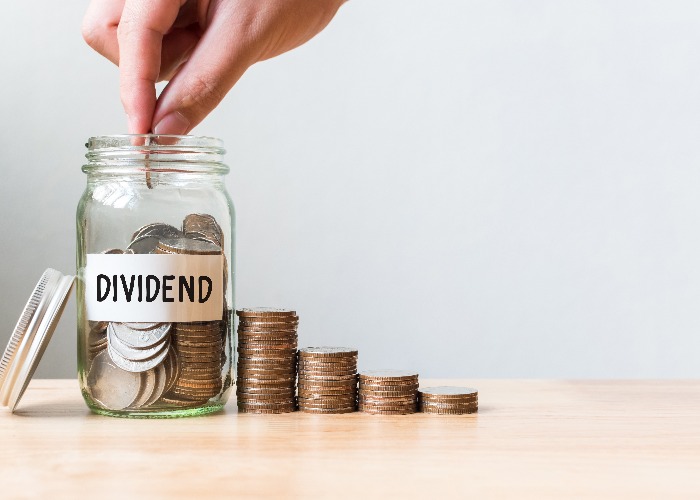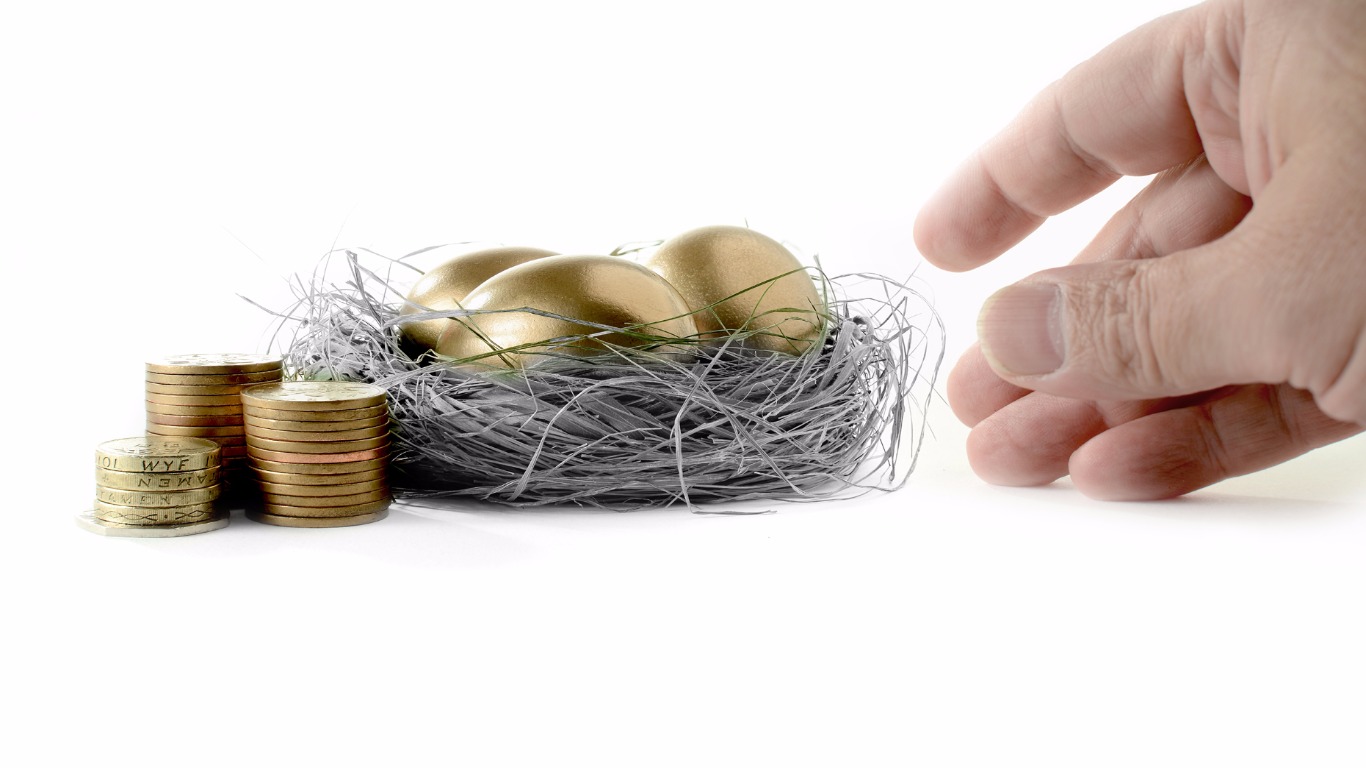High dividend stocks: how companies reward shareholders

With dividends making the headlines, we explain how they work and why they’re so attractive to investors.
Sections
- Dividends: huge rewards for investors
- ...but they're disappearing fast
- Still vital for investors
- How dividends work
- What are their benefits?
- How can investors get exposure to dividends?
- Which companies paid the most dividends?
- What’s the outlook for dividends?
- Investing in funds
- How are dividends taxed?
Dividends: huge rewards for investors
UK companies rewarded their shareholders with a record £110.5 billion in dividends in 2019 – but there’s little prospect of a repeat performance this year.
Rising global stock markets and the artificial boost from £12 billion of special dividends gave income investors a tremendous boost.
It meant that for every £20 invested in the UK stock market at the beginning of 2019, investors have already earned an average of £1.02 in income from their shares.
...but they're disappearing fast
However, companies are now scrapping dividend payments as the coronavirus continues to have a devastating effect on stock markets around the world.
Banks have effectively been told to scrap planned payouts, while retailers, travel firms, bookmakers and house-builders have all either cancelled or deferred payments, or suspended plans for share buy-backs.
These include Kingfisher, which owns B&Q and Screwfix; broadcaster ITV; Go-Ahead and Stagecoach, the bus operators; and house builder Taylor Wimpey.
Emma Wall, head of investment analysis at Hargreaves Lansdown, expects more companies to announce changes to expectations – even if these cuts are purely precautionary.
“The oil and gas sector and financial stocks may also see dividends cut or cancelled as the falling oil price and a cut in interest rates put pressure on revenues,” she says.
How to invest: read our complete guide to shares, buy-to-let, peer to peer and more
Still vital for investors

However, she insists that income-paying investments remain vital – especially in the wake of the extreme market volatility that has resulted in dividend-paying stocks suffering huge losses.
“They should always play a part in any portfolio – even ones focused on growth, thanks to the compounding uplift of reinvestment – but they are more important than ever now,” she says.
Despite further cuts coming, Wall insists that a UK equity income fund or well-diversified selection of shares will still kick off a higher-than inflation yield.
“This can either provide you an income today, without you having to cash in units during a market slump, or be reinvested to help you claw back losses more quickly,” she explains.
So, how do dividends work, what are the potential longer-term investment benefits, and how can you get such exposure?
How dividends work
Dividends are sums of money paid regularly – often annually – to shareholders by a company out of its profits or reserves.
The level of these rewards are decided by the company’s board of directors and approved by shareholders through their voting rights.
Companies that pay regular dividends are more likely to attract investors. This creates demand for their stock and helps bolster share prices.
View your options at the loveMONEY investment centre (capital at risk)
What are their benefits?
Investors use dividends in a number of ways, according to Emma Wall at Hargreaves Lansdown.
“Some people use them to generate cash from their investments, without dipping into the capital itself,” she says.
“It can be a brilliant way for older people to supplement their retirement income.”
Other investors like to reinvest the income.
This has a profound effect on overall returns as it compounds the growth on the investment.
“The average UK equity income fund, held over the last ten years, would have risen by just under 30%,” says Wall.
“However, if you reinvested the dividends, it would have more than doubled.”
In tougher times, they play an important role in softening the impact of price movements.
In fact, if you’re reinvesting the dividends, and have a long time horizon, price falls can work in your favour.
“As long as the dividends keep coming, you get more for your money when you reinvest, and the compounding effect is even more dramatic,” she adds.
How can investors get exposure to dividends?
Some buy individual shares in companies that have a strong commitment to the dividend. When a company delivers on its promises, the investor will be rewarded.
However, the problems come when the company cuts the dividend. If it’s income the investor is relying on, then this will be an issue.
“One way to spread the risk is by investing in a fund that’s focused on good dividend payers,” says Wall.
“That way the risk is spread, so if one dividend falls it can be offset by others.”
View your options at the loveMONEY investment centre (capital at risk)
Which companies paid the most dividends?

Oil, gas and energy were the UK’s largest-paying single sector during 2019, according to the Link Group’s UK Dividend Monitor Q4 report.
“The miners have provided the main engine of UK dividend growth in the last four years, increasing their pay-outs six-fold since the commodity slump of 2015- 2016,” it stated.
The banking sector also made a significant contribution to growth in 2019.
The total rose by a third to £15.6 billion, making 2019 the first year to see larger pay-outs than 2007, indicating just how long it has taken for the sector to recover from the financial crisis.
And it's worth reiterating that many banks are expected to scrap planned dividend payouts in order to better support vulnerable customers and it's unclear what this might mean for future payments.
Elsewhere, there was solid growth from tobacco companies, while the food retail sector continued to recover, thanks in particular to big increases by Tesco.
The weakest performance came from the telecoms sector, which is suffering from heavy investment needs and weak pricing, according to the report’s findings.
The total paid fell by more than a quarter year-on-year, following a steep cut from Vodafone.
Most companies in the sector either reduced their dividends or only managed to hold them steady.
“Vodafone was once firmly positioned among the UK’s top five payers, but has been slipping down the rankings in the last three years,” it stated
What’s the outlook for dividends?
The study warned that the big engines of dividend growth over the last three years – miners and banks – were less likely to propel dividends in 2020.
The stronger pound and likely lower special dividends were also expected to depress growth, with headline dividends predicted to fall 7.1% to £102.7 billion.
Underlying pay-outs (excluding specials) were expected to drop 0.7% to £97.9 billion, equivalent to an increase of 1.1% on a constant-currency basis.
“Our preliminary 2020 forecast is for headline dividends to fall 7.1% to 102.7 billion,” it stated.
“Excluding special dividends, we expect underlying pay-outs to fall 0.7% to £97.9 billion.”
Of course, this report came before the Coronavirus outbreak so the number of dividend cuts over the coming months is likely to be substantially higher.
Traditional dividend paying sectors, such as oil and financials, will be affected, according to Helal Miah, investment research analyst at The Share Centre.
He suggests there were already doubts whether the two oil majors, BP and Royal Dutch Shell, would be able to pay generous dividends as societies transitioned to lower carbon economies.
“The plunge in oil prices since the outbreak means it’s almost certain this year’s earnings will be stretched to pay-out those dividends,” he says.
“A cut looks inevitable if prices don’t recover soon.”
The financials are another major dividend payer with the banks’ net interest margins now being squeezed further by the Bank of England’s two unscheduled emergency rate cuts.
“The longer this crisis goes on then the more bad loans will rack up all of which will put pressure on margins overall and the ability to continue generous dividends,” explains Miah.
View your options at the loveMONEY investment centre (capital at risk)
Investing in funds
An alternative to buying individual stocks is opting for an investment fund.
This enables you to spread your risk and leave the decision making to an expert.
According to Darius McDermott, managing director of FundCalibre, actively managed equity income funds are the best way to access dividend-paying companies.
“The UK has always been a hotbed for income with the FTSE 100 typically yielding around 4%,” he says.
“Funds worth considering are Royal London UK Equity Income and Rathbone Income.”
While the FTSE 100 offers the best dividend returns, investors may prefer to diversify, given the concentration of dividends paid by the top 15 companies in the blue-chip index is high.
“If investors want diversification, I would suggest a fund like Gresham House UK Multi-Cap Income, which invests in smaller dividend-paying companies,” he says.
Another way to diversify your income is through a global equity income fund.
“For this, I would look at the likes of the BNY Mellon Global Equity Income fund, which aims to generate a yield at least 25% greater than that of the global stock market,” he adds.
How are dividends taxed?
Given how generous dividends can be, it won't surprise you to hear that the taxman wants a slice of the pie.
We asked Sarah Coles, personal finance analyst at Hargreaves Lansdown and member of the loveMONEY Expert Panel, explains what you need to know about dividend taxation.
“Everyone has a Dividend Tax Allowance of £2,000 a year, so they can receive up to £2,000 in dividends outside of an ISA or pension before they pay tax.
“If you receive dividends over your allowance, Basic Rate taxpayers are taxed at 7.5% on the excess, higher rate taxpayers at 32.5% and additional rate taxpayers at 38.1%.
Finally, Coles points out that there’s no difference in the taxation of dividends within a fund and in a direct share investment.
“It’s worth noting that this is payable regardless of whether the income is taken or reinvested,” she concludes.
The information included in this article does not constitute regulated financial advice. You should seek out independent, professional financial advice before making any investment decision.
Comments
Be the first to comment
Do you want to comment on this article? You need to be signed in for this feature